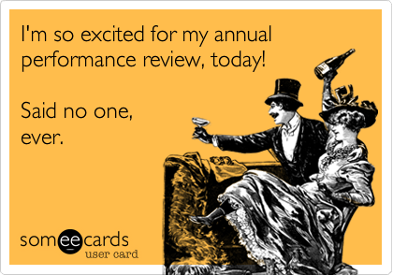I’m rather old seasoned; I’ve managed people in different roles for the better part of 17 years. I’m not saying I’ve always been successful at managing people, but I do have a bit of data on some of the things that many managers struggle to wrap their heads around. One of the most difficult duties of a manager, from my experience, is performance reviews.Most businesses are satisfied with the “same old, same old” review process. And I don’t know why that is. Maybe it’s because it’s easier. Or maybe it’s because people want to avoid conflict, so they just table the “hard to have” conversations. But there’s the rub: if we aren’t willing to talk about difficult topics as well as easy ones, how often will annual reviews encapsulate your entire body of work?
Let me give you an example. Meet Bill. Bill is a software developer at XYZ Software. Bill starts his new engineering gig in May. Out of the gate, he’s off to the races. He has some semblance of a job description, but no real goals. That doesn’t matter to Bill; he has a real zeal for his job and he’s on board with the company’s mission. He really feels like a productive part of the team.
Bill continues to work hard day in and day out for the next year. When his one-year anniversary rolls around a year from his start date, Bill’s manager sets up his annual review. We’ve all been through this process, right?
Anticipating his review, Bill’s anxiety starts to build. And while he feels he gave it his all, a sense of doubt creeps in: “Did I do as well I think I did? What were my actual goals? And do you think they’ll remember all the work I did nine months ago?” We have all been there.
By all accounts, Bill has been a model employee for more than 10 months but, in December, the project he has been working on goes off the rails, through no fault of his own. One of the developers on the team quit. The client was also slow to give feedback on new features. And the holidays threw a wrench into timelines, so the project’s overall velocity took a hit.
When Bill sits down for his review, he is shocked and dismayed that 90 percent of the feedback in the review centers around this small period of time. All of this was a blip on the radar in his mind. His first year had gone really well or so he thought. None of his review focuses on his seamless onboarding and subsequent blending with the new team. And no one talks about his ability to produce consistent and quality software over his first 10 months.

Instead, in this annual review, he is beaten into submission like a pinata at an 8-year old’s birthday party. End result? No raise and a building sense of resentment in Bill. Couldn’t this have been avoided with more frequent feedback? It would seem that constant feedback could have managed expectations on both ends considerably.
At stable|kernel, we perform 90-day, 6-month and 12-month performance reviews. We also do weekly 1:1 conclaves with our entire staff; a conclave is just a fancy term for a 1:1 meeting with a manager/leader. Here’s my business partner, Joe Conway’s, take on the importance behind our weekly conclaves:
“Everyone here has been selected to be a part of this company at this stage because Jason and I have the belief that your impact will be profoundly positive. Beliefs are, quite simply, bets on the truth hidden inside the unknown. We can’t prove with an equation that the way we do our jobs and live our lives will lead to success and happiness, but this company is a bet they do. An important corollary: if we’re right, we’ll enable our families, teammates and clients to be successful and happy. This is the true goal and measure of our success as a company.
The conclaves are about syncing up our beliefs. We’ll really just listen to each other and get each other’s perspectives. When you are inevitably in a position of leadership, we will have evolved and communicated our beliefs so that the next generation of stable/kernelers will have a clear path to success and happiness. My hope is that they, too, can pass this on to the generation after them.”
The annual performance review process (as a standalone) doesn’t make sense anymore if we want to align personal beliefs with company visions. Frankly, I don’t know if it ever really did. I firmly believe that performance reviews of employees should take place all the time. There should never be any big surprises because the dialogue between manager and employee is one of constant contact. You’ll find that employees need, and want, regular feedback (daily, weekly, etc.), so a once-a-year review is not only too late, but it’s often a shock. Regular coaching and management of expectations are key to alignment and performance. Moreover, there is no way for a manager to “judge” or “score” an entire year’s worth of work. And this just makes the annual review even more awkward and uncomfortable.
There’s another, and perhaps, important reason to have regular meetings: some people are poor fits and, more than likely, poor performers. And, you never want to keep a poor performer on staff longer than absolutely necessary. Not only because it impairs quality, but it can cripple morale and company culture.
Here are some of the keys to getting a better handle on employee performance:
- Talk about performance regularly and let employees create their own goals on a regular basis. Have managers provide ongoing feedback and teach them how to have honest conversations.
- Get employees to self-assess. Most people have a decent idea about their own strengths and weaknesses — give them an open and positive opportunity to share it.
- Give feedback regularly. Once managers do it on a regular basis, they will learn to appreciate the value of feedback more.
- Set and reset goals frequently. Sometimes targets move. So we shouldn’t leave goals in place that don’t make sense or stop making sense over time. Adjust goals frequently.
- Leaders should work from a cultural framework (see: core values).
Don’t be afraid to get away from those annual performance reviews and move to something more frequent. As a leader, you will be able to assess, guide and prioritize so much better. And your employees will likely be happier and a lot more productive around the office too.
For some more great tips about employee performance, check out “The Seven Steps to Coaching Your Employees to Success.”
 Jason Russell
Jason Russell
 Jami Sieder
Jami Sieder